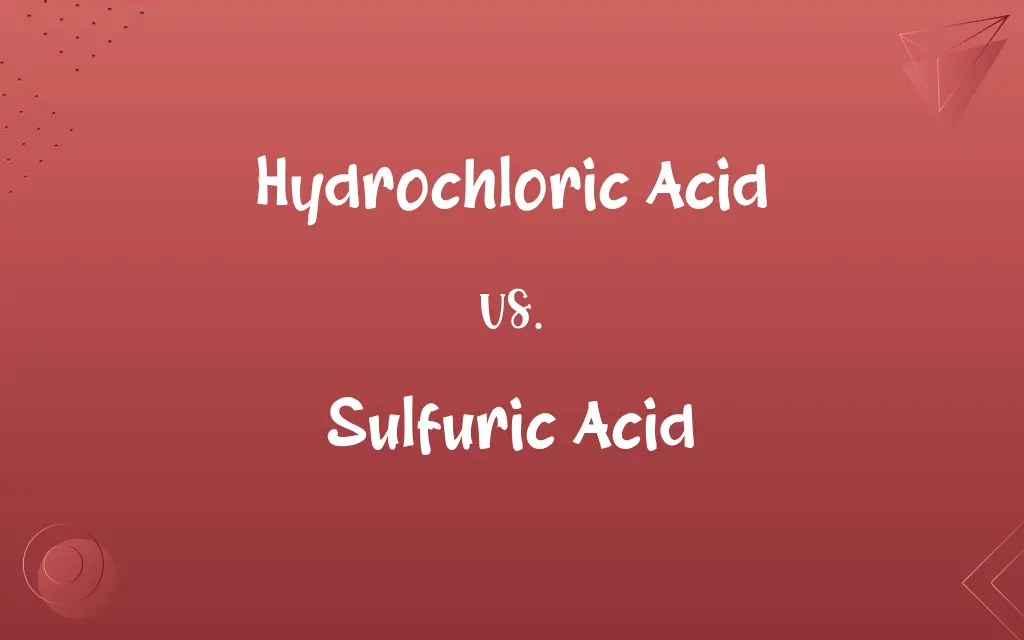Hydrochloric Acid vs. Sulfuric Acid: Know the Difference

By Shumaila Saeed & Dua Fatima || Published on October 10, 2024
Hydrochloric acid is a strong, monoprotic acid used in metal processing and pH regulation, while sulfuric acid, a strong diprotic acid, is used in fertilizer production and chemical synthesis.

Key Differences
Hydrochloric acid (HCl), a clear, colorless solution of hydrogen chloride in water, is notable for its use in cleaning metal surfaces and adjusting the pH in various industrial processes. It is a monoprotic acid, meaning it can donate one proton per molecule during the reaction. Sulfuric acid (H₂SO₄), on the other hand, is a colorless, oily liquid used extensively in the manufacture of fertilizers, in oil refining, and as a dehydrating agent in chemical synthesis. Being diprotic, sulfuric acid can donate two protons per molecule, making it very effective in reactions requiring a strong acid.
Dua Fatima
Oct 10, 2024
The physical properties of hydrochloric acid, such as its sharp, pungent odor and highly corrosive nature, make it effective for removing rust and cleaning steel in preparation for galvanizing or other processes. Sulfuric acid's ability to absorb water from the air and its exothermic reaction when mixed with water demonstrate its powerful dehydrating properties, useful in organic synthesis and as a drying agent.
Shumaila Saeed
Oct 10, 2024
In terms of industrial use, hydrochloric acid is crucial in the food industry for processing sugar and in the production of gelatin, while sulfuric acid's role in producing phosphate fertilizers highlights its importance in agriculture. Additionally, sulfuric acid is instrumental in battery acid manufacture, particularly for lead-acid batteries.
Shumaila Saeed
Oct 10, 2024
Safety concerns when handling these acids include their ability to cause severe burns and their reactive nature, especially sulfuric acid's exothermic dilution, which requires careful handling to prevent thermal burns and explosions.
Hifza Nasir
Oct 10, 2024
Despite their dangers, both acids play essential roles in environmental processes; hydrochloric acid is involved in the natural stomach acid composition, aiding digestion, while sulfuric acid is a key component in acid rain, showcasing the environmental impact of industrial emissions.
Dua Fatima
Oct 10, 2024
ADVERTISEMENT
Comparison Chart
Uses
Metal processing, pH regulation, food industry
Fertilizer production, chemical synthesis, battery acid
Shumaila Saeed
Oct 10, 2024
Physical Properties
Clear, colorless, pungent odor
Colorless, oily, absorbs water
Shumaila Saeed
Oct 10, 2024
Industrial Importance
Used in cleaning metals, gelatin production
Essential in producing fertilizers, refining oil
Hifza Nasir
Oct 10, 2024
Safety Concerns
Corrosive, causes burns
Highly corrosive, exothermic reactions, dehydration
Dua Fatima
Oct 10, 2024
ADVERTISEMENT
Environmental Role
Part of stomach acid, aids in digestion
Component of acid rain, affects ecosystems
Shumaila Saeed
Oct 10, 2024
Hydrochloric Acid and Sulfuric Acid Definitions
Hydrochloric Acid
Commonly found in the stomach, aiding digestion.
Stomach acid, primarily hydrochloric acid, helps break down food.
Dua Fatima
Mar 05, 2024
Sulfuric Acid
Highly corrosive, requiring careful handling.
Diluting sulfuric acid must be done by adding acid to water to avoid explosions.
Dua Fatima
Mar 05, 2024
Hydrochloric Acid
Used in producing gelatin and other food products.
Hydrochloric acid breaks down collagen in gelatin production.
Hifza Nasir
Mar 05, 2024
Sulfuric Acid
A strong, diprotic acid used in fertilizer and battery acid.
Sulfuric acid is key to manufacturing phosphate fertilizers.
Dua Fatima
Mar 05, 2024
ADVERTISEMENT
Hydrochloric Acid
A strong, monoprotic acid used in metal processing.
Hydrochloric acid cleans rust from steel before painting.
Dua Fatima
Mar 05, 2024
Sulfuric Acid
Plays a critical role in chemical synthesis and oil refining.
Sulfuric acid dehydrates compounds in organic synthesis.
Shumaila Saeed
Mar 05, 2024
Hydrochloric Acid
Essential in pH adjustment and the food industry.
Hydrochloric acid regulates pH in swimming pools and water treatment.
Shumaila Saeed
Mar 05, 2024
Sulfuric Acid
Recognized for its water-absorbing and exothermic properties.
Mixing sulfuric acid with water releases considerable heat.
Shumaila Saeed
Mar 05, 2024
Hydrochloric Acid
Known for its corrosive properties and sharp odor.
The sharp smell of hydrochloric acid is noticeable during cleaning.
Shumaila Saeed
Mar 05, 2024
Sulfuric Acid
Influential in environmental processes like acid rain.
Industrial emissions of sulfur compounds lead to sulfuric acid in acid rain.
Shumaila Saeed
Mar 05, 2024
Repeatedly Asked Queries
Can hydrochloric acid and sulfuric acid be used interchangeably?
Due to their different properties and reactivities, they are not generally interchangeable and are chosen based on the specific requirements of a process or reaction.
Shumaila Saeed
Oct 10, 2024
How do hydrochloric acid and sulfuric acid impact the environment?
Hydrochloric acid is a component of natural digestive acids, while sulfuric acid contributes to acid rain, which can harm ecosystems.
Hifza Nasir
Oct 10, 2024
What is hydrochloric acid used for?
Hydrochloric acid is used in metal processing, pH regulation, and food industry applications, among others.
Dua Fatima
Oct 10, 2024
What are the primary uses of hydrochloric acid in the food industry?
It's used in processing sugar, producing gelatin, and other applications where pH adjustment is required.
Hifza Nasir
Oct 10, 2024
What role does sulfuric acid play in battery production?
Sulfuric acid is used as the electrolyte in lead-acid batteries, crucial for the storage and delivery of electrical energy.
Shumaila Saeed
Oct 10, 2024
What safety precautions are necessary when handling these acids?
Proper protective gear, including gloves and goggles, and careful dilution techniques are essential to prevent burns and inhalation of fumes.
Shumaila Saeed
Oct 10, 2024
How does sulfuric acid differ from hydrochloric acid in chemical reactivity?
Sulfuric acid is a diprotic acid capable of donating two protons, making it more versatile in chemical reactions compared to the monoprotic hydrochloric acid.
Shumaila Saeed
Oct 10, 2024
Is hydrochloric acid found naturally in the body?
Yes, it's a major component of stomach acid, playing a vital role in digesting food and killing harmful bacteria.
Hifza Nasir
Oct 10, 2024
What environmental concerns are associated with sulfuric acid?
It's a significant component of acid rain, which can lead to the acidification of soils and water bodies, damaging wildlife and vegetation.
Shumaila Saeed
Oct 10, 2024
Why is sulfuric acid important in industrial applications?
Its strong acidity, dehydrating properties, and ability to donate two protons make it invaluable in fertilizer production, chemical synthesis, and refining processes.
Dua Fatima
Oct 10, 2024
Share this page
Link for your blog / website
HTML
Link to share via messenger
About Author
Written by
Shumaila SaeedShumaila Saeed, an expert content creator with 6 years of experience, specializes in distilling complex topics into easily digestible comparisons, shining a light on the nuances that both inform and educate readers with clarity and accuracy.
Co-written by
Dua Fatima







































































